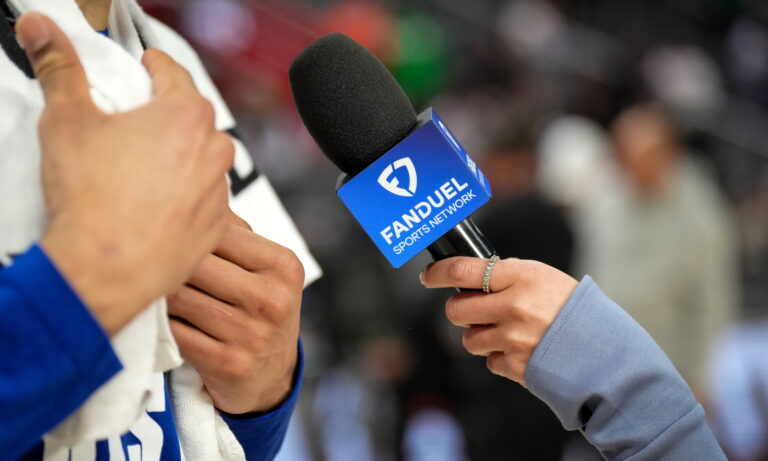Hours after the FBI arrested Terry Rozier and Chauncey Billups, and published a pair of indictments detailing the former’s alleged involvement in a cooked prop-bet unders scheme and the latter’s alleged involvement in a rigged mafia poker game, the sports-watching public turned to sports media to help make sense of the story. They found a press corps telling them that the probable sudden end of a coach’s career and the unearthing of a gambling ring were mere growing pains for an industry just getting its feet under it. Actually, they said, some good might come of this.
“If gambling’s gonna be more and more prevalent, we’re probably gonna have a couple bad apples,” said Bill Simmons the day the story broke. “Everybody’s gonna learn how to behave and deal with it.” After his guest searched for the word “constrict” for 30 seconds in service of a point about how the gambling companies could solve their problems by simply constricting available prop bets, Simmons noted, “We’ve always been doing this. We’re more honest about it now. And in the process of being more honest about it, I think there’s gonna be a couple hiccups that ultimately, that if we can police all this … it’s gonna be a plus, not a minus.”
The idea here is that by bringing gambling out of backrooms and onto smartphones, gambling companies can more accurately detect irregular betting patterns and close off suspicious bets, preserving the integrity of the game, and more importantly, the sanctity of online gambling. This is not dissimilar from the ways other corners of NBA media covered the story. Zach Lowe had ESPN’s betting guy David Purdum on his podcast the same day; the conclusions they reached were that Rozier-esque issues can be tweaked out of existence by reducing prop bets, and that worries about players sharing inside information with people who turn out to be gamblers can be allayed by changing how NBA teams report injuries. Lowe’s podcast, like Simmons’s, began with a FanDuel ad. These are two particular examples, though they are broadly representative of how the sports media world has handled the story, are indicative of the industry’s deadly blind spots. The NBA itself, in a memo sent to teams on Monday, was only willing to suggest “additional scrutiny” on prop bets as a potential solution.
Lowe, unlike Simmons, possesses critical-thinking abilities and is capable of self-reflection, and he at least talked about addiction and named an important contradiction: his own FanDuel ads. His conclusion was simply that “everyone is compromised.” He is almost right—can anyone think of a media company not compromised by gambling partnerships?—though the explanation is neither exculpatory nor sufficient to the structural realities of online sports gambling.
Much has been made about sports gambling’s takeover of sports media, a nasty marriage enabled by the simultaneous legalization of app-based gambling, now available in 38 states, and the drying-up of media’s traditional revenue streams. The first-order concern is that a mass onboarding event of (mostly) young men into the frictionless experience of making a few prop bets and a parlay every other NFL Sunday serves to activate and exploit whatever latent gambling addiction might otherwise go untapped in the population. Addiction, and not the odd $15 thrown around here or there, is the true engine of the sports gambling economy, which I think is a critical fact to establish when discussing every league and big-time media shop’s gleeful partnership with betting companies. A very good recent Rolling Stone story highlighted both the harrowing realities of addiction and the alarming prevalence of sports gambling among college-age young men. That alone rebuts the idea that gambling is eternal and inevitable, and that diverting it all onto apps with monitored marketplaces actually protects everyone (or anyone).
The second-order concern, and one far more relevant to this scandal, is that a sports and sports-media world funded by gambling companies is unable to grapple credibly with a story like this. Inherent to claims that problem gambling can be managed away merely by reducing prop bets or changing how injuries are reported is a framing of sports gambling as an immutable law of nature, rather than something millions of people are doing every day now, who previously were not doing it at all, because it is on their phones. There’s not even a hint, in any mainstream sports-media conversation about this scandal, that legalized sports gambling may have been a bad idea.
That’s an essential prior to have before you move onto the broader and more uncomfortable topic of widespread sports gambling having warped the relationship between game and fan. Basketball on TV is no longer merely an entertainment product, an aesthetic experience, or an exercise in tribalism; it is an interactive experience, a moneymaking platform, something that the gambler is part of—if not something that exists explicitly to facilitate wagering. In every ad for sports gambling, the company will advertise that betting will take the fan inside the action, or bring them closer to the game. That’s a fundamentally different sort of experience, and it tracks that people having that experience will develop both a fundamentally different relationship to the game’s real participants (as evidenced by the ceaseless harassment players face by stricken gamblers) and a fundamentally different understanding of the purpose of sports. Players are just as inundated with the gambling industry’s exhortations to use its products as fans are. Is it any surprise, then, that some of them may have started to see their own jobs as just a means to an end? Games exist, in this mindset, primarily as market opportunities.
One could make a case that sports gambling is simply too entrenched now for the basic question of its appropriateness in society to be worth litigating—that there is no point indulging in optimistic counterfactuals about how things could be better or different were every 21-year-old with an untapped addiction issue not on the verge of losing everything and dropping out of society due to the frictionless ease and constant availability of carrying a casino in their pocket. I would argue that engaging in such counterfactuals is an essential task for writers and professional commentators, that untangling thorny contradictions in the world as it exists and imagining and articulating a better world, one without those compromises, is more or less the job. But diagnosing any of this, or making an argument against sports gambling, is beyond the scope of a sports media largely funded by its audience’s predators.
The omnipresence of sports gambling, and its total takeover of big-time sports media, limit the acceptable parameters of conversation and debate. Maybe Lowe, the ESPN guy, and Simmons would all have the exact same takes even if they were not being propped up by the gambling industry, but there’s no way of knowing it. Are they hopelessly compromised, or are they only continually allowing themselves to appear that way? Is there any difference?


